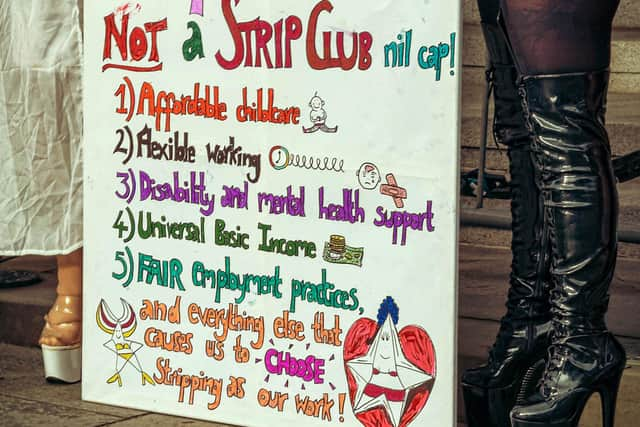Edinburgh strip clubs: Former police inspector defends ban 'as they are a form of violence against women'
and live on Freeview channel 276
It comes after exotic dancers who are gearing up to protest over the council ban claimed safety fears were ignored and accused the council of a "vendetta".
The 'nil cap' policy, which will see the triangle of bars in Westport and a fourth club in the city centre forced to close, has provoked fury among dancers who warned that women will lose livelihoods and be forced underground to work in Airbnbs, hotels and ‘saunas’.
Advertisement
Hide AdAdvertisement
Hide AdLabour and Tory members defeated an SNP bid to protect existing venues, after hearing from activists who said clubs promoted the sexual objectification of and violence towards women.


Some SNP and Green councillors who voted to allow existing clubs to remain open accepted that the ban could actually expose women to a greater risk of harm.
Tory councillor Cameron Rose said the council is not “in control of this” and that the sexual entertainment venues have ‘monopolised’ the debate in the Capital.
The former police inspector said: “There have been many articles across the media focusing on the views of industry who have monopolised the debate. The other side of this argument is lost.
Advertisement
Hide AdAdvertisement
Hide Ad"I see the potential safety and employment issues. But the argument that this will push women underground is not new. We must be concerned about the huge underground industry in commercial sexual exploitation including trafficking and prostitution. If you extrapolate from national figures, this must be going on in Edinburgh.
“The Police can take action on that with a view to enforcing the law.
"It’s less graphic than an interview with a pole dancer. But the fact is that these clubs are part of a continuum, a complex process of objectification of women. They create demand and supply it.
“We don’t know if these women will be less safe. The council is not in control of this. It may have an influence in some areas but doesn’t hold the solution to all issues.”
Advertisement
Hide AdAdvertisement
Hide AdLabour councillor Joan Griffiths, who proposed the ban, said the council would "work with women to help them look at their careers and at other employment options.”
Mr Rose recognised the blanket ban could also create employment issues for the 100 workers in the clubs but insisted help was available.
And he retains the view that stripping is a form of violence against women - despite industry pleas to let women choose.
"There are many employment opportunities available and support programmes for vulnerable people so am not sure there are grounds to put in place specific measures for these women. That’s too intrusive an interpretation of the council’s role.
Advertisement
Hide AdAdvertisement
Hide Ad"These venues are demeaning. This is not just about this small group of women – the significance of this goes beyond that to a broader scope of women, including those who are less visible than the dancers. Ultimately it would be a contradiction of the equally safe national policy if these clubs stayed open, we can’t allow or encourage commercial sexual exploitation, it’s a form of violence against women. On balance the ban is the right decision.”
Comment Guidelines
National World encourages reader discussion on our stories. User feedback, insights and back-and-forth exchanges add a rich layer of context to reporting. Please review our Community Guidelines before commenting.
